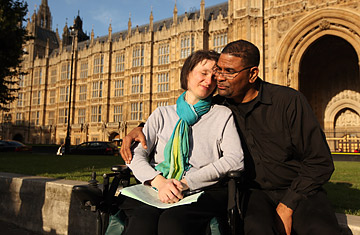
Debbie Purdy plans on going to Switzerland to end her life. But the Swiss government wants to tighten restrictions on assisted suicide in an attempt to reduce "suicide tourism"
As a maxillofacial surgeon, Jerome Sobel has brought a smile — literally — to hundreds of patients' faces. But the Lausanne physician has a second job that is far more somber: helping terminally ill people end their lives. Sobel is president for French-speaking Switzerland's chapter of EXIT, an assisted-suicide organization that provides a lethal dose of barbiturates to terminally ill patients who want to end their life.
But Sobel may soon have less to do in that second job. The Swiss government, concerned that Switzerland is becoming a destination for "suicide tourism," wants to tighten its decades-old assisted-suicide law, considered to be the most liberal of its kind in the world. As it stands, the legislation permits assisted suicide if a physician is convinced that the patient has no chance of recovery, that he or she is mentally and physically capable of making the decision to die and that the patient administers the drug — about 10 grams of sodium pentobarbital mixed with a fruit juice — in a private residence. (If a third party administers the drug, the act is considered active euthanasia, which remains illegal in Switzerland, though not in the Netherlands or Belgium.)
Switzerland's law dates back to 1942. But the government now says it is too lax and that it's sometimes misused — for example, by allowing those who suffer from a chronic or mental illness to die. A Zurich University study released last year found that a number of people with non-fatal illnesses opted for assisted suicide, an abuse the authorities say they are determined to stop. Among the proposed measures, still to be fine-tuned and debated in parliament, is the requirement that two different doctors attest to the candidate's suitability for assisted suicide and confirm the terminal diagnosis; currently only one physician's opinion is needed.
Officials are also concerned about the influx of foreigners from nations where assisted suicide is illegal — Britain, France, Germany — who are coming to Switzerland to end their lives. A government advisory body on biomedical ethics estimates that out of approximately 350 to 400 cases of assisted suicide each year, about one-third are from abroad. "We as a country have no interest in being attractive for suicide tourism," Justice Minister Eveline Widmer-Schlumpf told a news conference on Oct. 28. Not surprisingly, the Catholic Church, the country's largest religious denomination, welcomes the government's move. "Those of us who respect human life can't approve or encourage assisted suicide," Monsignor Kurt Koch, president of Swiss Bishops Conference, said in a statement.
Right-to-die proponents, however, are outraged at what they perceive as the government's interference in a personal matter. "This goes against the human right of self-determination — a principle that has been an integral part of the Swiss mentality for the past 700 years," says Bernhard Sutter, a board member of EXIT. Sutter says that the organization, which has 70,000 members, not only obeys the law, but also follows its own stringent guidelines, such as the detailed examination of a candidate's medical records, in-depth interviews and compulsory counseling about alternatives to suicide.
Vincent Minelli, director of the Zurich-based assisted-suicide group Dignitas, says that "if a new law is passed, the only thing it would accomplish is an increase in clandestine deaths and in the number of suicides in general." Unlike EXIT, whose membership is restricted to Swiss residents, at an annual fee of $27, Dignitas has sparked repeated controversy by helping people from abroad die in its clinic, including non-terminal cases like that of Dan James, a 23-year-old British rugby player who was paralyzed from the neck down and who ended his life in Zurich last year. While his condition was chronic, it was not terminal. Minelli tells TIME that people should have the right to "put an end to their lives to avoid lingering on in states of advanced physical or mental decrepitude."
Critics also say that, contrary to the law stipulating that assisted suicide should not be a profit-driven business, Dignitas is actively luring foreigners for financial gain. Minelli denies that any of the 1,027 patients he helped die since the group's founding in 1998 were recruited for profit, and while he charges about $7,000 per assisted suicide, he says the money covers only administrative costs and that poorer patients are charged a lower fee or nothing at all.
"There is no need for stricter regulations; they are already stringent enough," says Frank Petermann, an attorney specializing in medical law. "From a legal standpoint, it's difficult to understand how the Ministry of Justice can work out a draft bill that violates the Swiss constitution." That is one of the arguments that EXIT, Dignitas and other supporters of assisted suicide are vowing to use in their fight to maintain the existing law. "We will do all we can to combat this attempt at taking away our freedom," EXIT president Sobel vows. "If need be, we'll force a nationwide referendum."
That is not just an idle threat. Switzerland's unique brand of grass-roots democracy permits its citizens to challenge a legislative decision through a referendum if 50,000 signatures are collected within three months. Given that an April opinion poll by M.I.S. Trend, a market-research institute, found that 75% of Swiss voters are in favor of the existing liberal legislation, the assisted-suicide law may be a hard one to kill.
